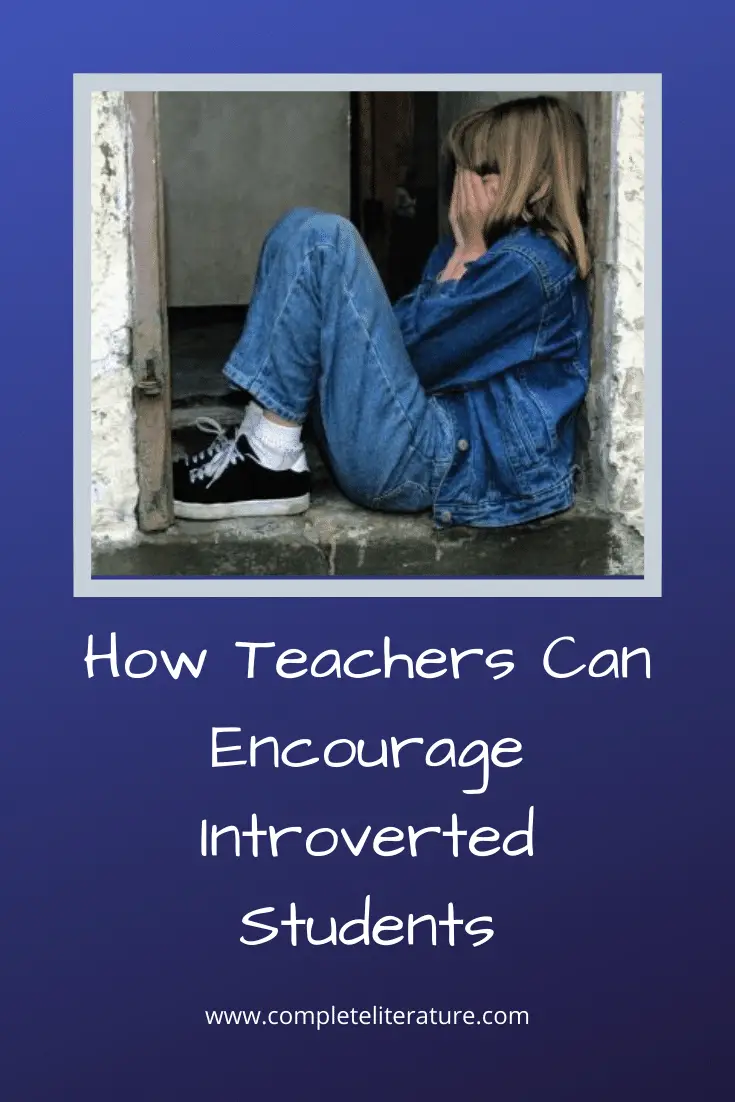We all know introverted people. They come from all walks of life and all ages. And we know that some people are extremely introverted while others are only mildly introverted.
So what makes people, and students in particular, introverted, and how can teachers encourage introverted students? Research has shown that people are born introverted or extroverted, but that their experiences will further form their tendencies as they grow up. And upon assessing their students, teachers can use their relationship with their students to nurture them in ways that develop this element of their personality in healthy ways.
Read on to find out what the research says as well as several ways that teachers can encourage introverted students to be the best that they can be.
Table of Contents
The Research
There is actually a lot of interesting research out on the subject of introverts and extroverts, terms coined by Carl Jung (himself an introvert) in the early 1920’s. While there is certainly good evidence that introverts and extroverts are “born that way,” there is also good evidence that your early years continue to form you one way or the other and put you wherever you end on the spectrum. Of course, nobody is entirely introverted or extroverted.
You can read more fascinating information about this in this article from Bustle. I have to admit, this was a super fun article to research because the information was so incredibly interesting!
Also, here is a chart that shows the range of introversion and extroversion in the general population. It would not be much different among children.

I would like to look at ways that teachers encourage introverted students, but first, I would like to share my personal experience growing up as an introverted student.
My Unusual Personal Experience
As an adult reading about school experiences across the country for students of all ages, I have learned that my school experience was not nearly typical. And for that I am so grateful.
I was a very introverted student. I was not pretty and wore glasses at the age of 10. And I will assure you that they were not good looking glasses. I was not popular. And my family didn’t have a lot of extra money.
Add to all of this the fact that I was raised in a small town. You would think from this description that my school experience would have been a poor one.
But it wasn’t. Maybe because it was a small town, we were all like extended family. While my appearance or glasses came up a couple of times, I laughed it off with the offending party. And they never really brought it up again.
I was bullied a couple of times. But both times, I acted unfazed and other students were quick to step in. They did not allow bullying of a fellow classmate. After those couple of times, it never happened again.
Introversion and Teachers
And as for my introversion and teachers, while it was very easy to hide among hundreds of students, a few of those teachers did see me. And they were sensitive enough to show that they could see me. They did it with well placed compliments and casual conversation. I later realized it was their way of making sure I was supported.
I had a very difficult home life which made it even easier to hide in my school. And I later realized that while I wasn’t talking about it, those teachers were seeing it. And they were doing things behind the scenes to help and encourage me that I had no idea until years later.
It was those teachers that changed the course of my life. I knew that they cared. And even though I wasn’t opening up to them about my struggles, I knew that they still had my back albeit in an unspoken way.

And that unspoken encouragement is what has helped me to be able to work with and support the children that have come through my classes through the years. Plus my own introversion has helped me to easily recognize it in those students and act accordingly. It has helped me to enjoy them, whether they are struggling with issues in life or having an easy time of it.
So with that, now let’s look into some ways that teachers can encourage introverted students.
1. Don’t Try to Change Them
Being introverted is not a shortcoming. It is an element of personality. Trying to force someone to be less introverted would be like trying to tell them they can no longer like chocolate.
So while introverted people can adjust their behavior to make life work in their circumstances, it doesn’t make them less or more introverted. They are still the same person. It certainly does not encourage introverted students.
And when teachers try to make introverted students do things to “get them out of their shell,” it generally just makes life more miserable and makes them less motivated to become more of what the teacher is trying to get them to be.
On the flip side, it doesn’t mean to ignore them and let them stay in the corner, so to speak, either. You can encourage them to come out a little bit. And as they get more comfortable, they will. They will get more verbal and more active within groups. But not if they are forced. Forcing anybody almost never helps them to improve.
2.Give Them Plenty of Space
One of the biggest strengths that introverts have is that they are generally very self motivated. They don’t need someone looking over their shoulder to make sure they got their stuff done. And you rarely have to repeatedly ask them to do things. They generally get it the first time. Or pretty close to the first time.
So when you give them assignments or whatever the classroom expectation is, you can generally expect that they are going to get it done pretty well and on time.
I do understand that not all introverts are exactly the same, so this is not a hard and fast rule.
One way that you can work with introverted students to make sure they are keeping up before an assignment is late is to ask them in passing how it’s going. They will be glad you cared enough to ask and also grateful that you weren’t expecting them to give you a public update in front of everyone during class.
If you do have an introvert in your class that is not self motivated, you can still work well with them. Just make sure you aren’t calling them out publicly. And you can encourage them to progress as long as you are not hounding them.
But then honestly, balance is key with all of your students, not just the introverted ones.
3.Teach the Whole Class How to Relate to People in Beneficial Ways
This is something that your introverted or extroverted students, for that matter, should be learning without even realizing that they are part of the reason you are teaching this. This kind of teaching happens throughout the year at times that you are able to bring character and personality traits into the discussion. Some opportunities to do that are:
- When discussing characters of literature books
- When discussing historical figures
- When discussing moral issues in government, history, politics, or virtually any other subject that you can be talking about character or personality traits.
- When discussing moral or character issues in family, work, social groups, social media, or any other situations in which they are relating to others.
Because this is such an all-encompassing factor in teaching, it is to your benefit that you can teach these concepts without any of your students feeling like a target. These are ways of dealing with themselves and others in real life. So you can teach it broadly enough that they won’t feel like you are singling them out. But they can certainly make the connections to the points you are trying to drive home.
4. Be Mindful of Introverts When Doing Group Activities
Introverts don’t necessarily dislike being in groups. They just don’t like being the center of attention in the groups. This is especially true of larger groups.
There also may be certain personalities that are more difficult for them than others. That is the same for all of us.
They could be fine in a large group setting that they are able to contribute without all eyes on them and feel comfortable. But then they could be extremely uncomfortable with a project that you assigned them to pairs to do. While one is a large group, they are not necessarily out of their comfort zone. And for the paired activity that they only had one partner to work with, if that partner was not sensitive to the best ways for them to work together, it would make them more miserable than to be in the large group.
The answer for this is pretty easy. It’s something we should be doing for all of our students, not just the ones that are introverted.
What Not to Do
Don’t split kids up into pairs or working groups until you have spent enough time with them to know how they will work with others. Also you will want to spend some time in class discussing what working in large groups should look like for them. You also wouldn’t want to pair two class clowns together because they would get nothing done. I’m sure you can think of lots of other ways that it would be harmful to put certain groups of kids together.
One huge warning here: be careful not to pair kids up that are distinct opposites thinking that they will balance each other out. That usually ends up in nothing productive getting done on either side.
What to Do
Knowing your students and planning activities accordingly is the key to success in your classroom. This bears out whether you are talking about introverts, extroverts, or any other personality or element of personality that could come up.
And we generally have a good handle on those issues within the first couple weeks of school. It really doesn’t take long.
Picking up on how they like to work with others is one of the best ways you can encourage introverted students.
One more good idea is to spend time weekly on specific teaching regarding social emotional health. I have an article here that can give you several great books to work through with your students on these issues. And the benefit to all of these books is that they aren’t overly involved. So you aren’t sacrificing a huge amount of classroom time.
5. Pay Attention to Their Body Language
Although not all introverts do not like to talk or speak out (generally just in situations that they are uncomfortable in), some will choose to be quiet and let others speak the vast majority of the time. When I was growing up and sometimes even now, I will not speak up because I feel that everybody else is doing just fine with the discussion without me having to weigh in. And that is okay. Not everybody has to comment every time.
But for those students who almost never speak up, you are going to need to get some feedback. By watching their body language, you can get a pretty good idea of when they are comfortable and when they are not. Asking them discreetly if there is anything you can do to help them when you see they are struggling will go miles in showing them that you are noticing and that you care. And that will do more to encourage introverted students to “come out of their shell” than any activities that they feel are forcing them to go in a direction that they are not comfortable going in.
And that directly leads us to our next point.

6. Don’t Force Them to “Come Out of Their Shell”
Back in my earlier school years, there were a couple of teachers that took the position that being introverted was a character flaw and they were going to get it out of us if it took them the whole year. While their intentions were good, their delivery was disastrous.
Pairing up introverts with extroverts, doing large group activities with no flexibility for the kids in them to do what worked best for them, or calling kids out because they felt like every student had to participate equally in classroom discussion are perfect examples of things that will not work in your classroom. These things will not encourage introverted students. They will frustrate everybody and make it impossible for anyone to concentrate on the task at hand.
I don’t think there are many classrooms operating this way anymore, but it does go just a step or two farther.
Making study habits pleasant for your students will have the opposite effect. They will be eager to see what you have for them to do and they will be excited about finishing those assignments and working with those other students that you know they will enjoy working with.
So with the same class, same materials, and same lesson plans, you can have vastly different results based on your organization and set up of the activities. Making sure that your students’ social emotional needs are being met is key to your success in these areas. And it is key to the success of encouraging introverted students to thrive in their setting.
7. Don’t Overlook Introverts Because They Aren’t in Your Face
Of all of my suggestions so far about how teachers can encourage introverted students, this one might be one of the toughest. And the simple reason for that is because when you are dealing with 20+ students on a daily basis, it gets difficult to take in all of the details. And sometimes you can see what is going on with the introverted students(s) in your class but you just can’t get over to them with all of the needs that arise on your way over to them to take care of their needs.
All I can say about this is that none of us can catch everything all the time, but be sensitive and aware of what is going on. Then if you can’t take care of it at the moment, you can revisit it before then end of the school day.
Even if you had to go back and address the issue later, I can promise you that the introverted student that you just noticed and showed that you were paying attention to will be very grateful.
8. Dispel the Myths of Introverts
Being introverted doesn’t necessarily mean they don’t like social interaction. In fact, being human pretty much means that you need human interaction in order to live and thrive. It just means that the interaction that they desire is not overly loud and crazy, but more calm and organized.
Don’t assume because there is no talking going on that there is nothing going on in their head. Many times the silence is because their minds are going a million miles an hour and they are too busy processing those thoughts to be talking.
Introverted doesn’t necessarily mean shy. While there are a large number of introverted students that are shy, it isn’t a 100% correlation. Shy refers to somebody that is faces anxiety and fear regarding social situations. But being introverted is more about thriving in calm environments.
Introverted students are not snobby. Many times people think introverted people think that they are better than them because they aren’t bothering to talk to them. It isn’t really that way. They just generally prefer to think about what they are going to say first before just talking. They also may just prefer to let others talk because they may not have anything new that they think needs to be put out there.
Not talking because they don’t feel a need to talk is not a shortcoming. It is actually a strength.
9. Stop Using a Grading System that Rewards Only Outward Signs on Learning
Because the classroom is filled with usually 20 or more students, it is not unusual for the loudest and most outgoing students to speak up first and be the most heard.
Introverted students probably don’t mind that much if at all. But to never contribute anything in class is probably not the best answer either.
So to find a happy medium is a good idea but easier said than done.
Requiring equal participation in class in order to be considered adequate participation is a problem. If your introverted students are learning the material well without being the center of attention in class, it is okay. Sometimes we forget that the point of school is that the students are learning material well. And those students are all going to prefer learning in different ways. So allowing them to communicate their learning in ways that are more comfortable for them is a great way to do that and grade them accordingly.
Giving students a choice between an essay or a speech to deliver what they have learned is a great way to let them use their strengths.
Maybe Just a Little Bit
So one final point I would like to make regarding encouraging introverted students in your classroom activities is that pushing them just a little bit can actually be beneficial to their learning and social emotional development. We all grow when we step just a little bit past our comfort zones. And that is applicable to introverted students as well.
Conclusion
The bottom line here is that all students need to feel safe and that their needs have been tended to. And as teachers, it is a super tall order, but still necessary that we are in tune with all of their students. If we can’t relate to them on a personal level we cannot properly serve them as teachers, and help them to learn and grow.
And on a final note, I would like to share with you one of my all-time favorite books. It is Quiet: The Power of Introverts in a World That Can’t Stop Talking. (Click on the title to go to the Amazon link.) I love this book so much because it speaks of the strength of introverts. Because at the end of the day, introverts are not defective. They just process differently, and in many ways, better than others. And that is just fine.
Here is a Ted Talk by Susan Cain regarding the power of introverts:
What are some of the ways you have been able to encourage introverted students in your classroom? I would love to hear more ideas. Feel free to comment below!
If you enjoyed this article, you will also love the following article:





My daughter was an introvert. It bugged me when people tried to change her
Yep, there’s nothing to change!
I am an introvert-two of my children are introverts and two are extroverts. I am not shy and none of them are shy or ever have been. I so appreciate you addressing this. Shyness is something they need help to work through-introversion is not.
Exactly right, Melanie!
When I have teachers ask how they can best support students in their classroom, these are all types I use. EVERY child is different, so adhering to the very factory style ‘one-size fits all’ modelling of learning we still employ is not going to work for every child. Adaptability and flexibility from teachers, meeting the students where they’re at is crucial!
Exactly, Stephanie! Thank you for speaking out for the kids and helping the teachers!
I’m not a teacher but I do have two kids and one is introverted. I love this level of research on the subject, and it’s such good advice, I think! Especially about not trying to change them.
Thank you, Tamara! I hope some of this is helpful for your introverted child.
Great post once again. I wish I had a teacher who was there for me when I was growing up. I was so introverted and hurting, I could really have used encouragement.
I am so sad to hear this. And I am sad that your story is not that unusual. There are so many well-meaning teachers. I just wish they could be trained to pick up on these things. Hugs to you, sweet friend!
I absolutely love this post. As an introvert I wish I had been encouraged more by teachers. I had a few that stick in my mind but not many. Wonderful post friend.
Thank you, Krysten! I am glad that you at least had a couple of encouraging teachers. I am sure that it has had an impact on you to this day.
I had some introverted friends when I was at school but fortunately we were a great group. Teachers helped everyone to form this amazing group. – Paolo
I love hearing this, Paolo! You and your group are a lucky bunch. 🙂
Giving students spaces are important. I’ve seen a couple of friends back in school who didn’t get space as they were introverted.
I hope they were able to find what they needed to get through that time successfully. Thank you for sharing, Fransic.
This is awesome. My daughter (Kindergarten) is uncomfortable around people she does not know. Her teacher has been really great about it and my daughter has exceled as a result. Thanks for sharing this. I wish all teachers got it.
I am so happy to hear that, Scott! Your daughter is very fortunate to have a teacher that is so well tuned in to her students.
This is so thoughtful. I remember some teachers in school requiring everyone to talk or present, and I remember how much some kids hated it. I didn’t love it, but I tolerated it. If you cater to an introverted student, I’m sure it would encourage them to try new things in the future.
Yes, Candace! You can’t bring an introverted child out of their shell if they aren’t able to find any comfort. Pushing them makes it so much worse.
I resonate with this so much. I was an introverted student, and I’m still very introverted. It would be good for teachers to be mindful of such students.
I hope this would resonate with all of us introverts. It’s pretty easy to recognize one another in a crowd. 🙂
I am still introverted. I’m pretty sure I will always be this way and I am at peace with it. But it would be nice for those children that are hassled for being introverted to be understood and treated accordingly. Thank you for sharing with me!
I wish people read this post and follow the advise. it is a big issue for all introverted kids
Me too, Lyosha!
I am a teacher and do things all of the time behind the scenes if I think it will help my students. A lot of us do. 🙂
That is very true, Rose. I see a lot of teachers going that extra mile once they get to know their students. Thank you for paying attention and helping to make their day a little better! <3
I am definitely an introvert, i wish my teachers and guardians were aware of it
I hope that as time goes on, more teachers are trained to recognize it and work with the children in the best ways. Thank you for sharing, Nina.
Such a great post! This is an important topic that we should share to others. Thanks for this!
I have a friend with an introvert child and i do consider teachers should take to consideration things like you mention in this article. It is well researched and presents a great reference.
Thank you, Olya.
My husband is an introvert and I consider myself an ambivert, which means I am both intro and extroverted!
Those are great ways to reach out to people who are introverted. I know I always felt like I was introverted although I think some people were far more introverted than I was.
I was an introvert when I was in high school – still am but got better at engaging in class at university – and i would go in such a panic when a teacher would interrogate in front of the whole class. Those are great tips.
I really love reading all of your posts. Although I’m not a teacher, I’ve had to become one during the pandemic. So many of your posts have helped me immensely. My kids aren’t introverted, but I know some parents who have kids that are, even on their Zoom classes. This is going to be a big help.
I am glad that I can be helpful to all teachers, whether at home or school or anywhere! Thank you for sharing your thoughts, Brianne!
I do applaud teachers for their patience and kindness. These are wonderful tips to exert in the classroom for sure!
Interesting tips! It’s so important to ensure every child is getting what they need and accommodating your approach individually would be so useful.
I think i fall in between introvert and extrovert tendencies. These tips are very helpful especially in dealing with introvert children
Great article! Every teacher should read it. I’m gonna share this.
I too was an introvert and hated, and still hate being the centre of attention. I would love to be more confident and extrovert but that’s really not me.
This is great article and informative too. Even parents and teachers both should read this article. One of kid is introverted.
I agree with all the points made in this article! Introverted kids should be encouraged in a gentle manner, thanks for sharing!
I am an introvert myself. Hope everyone around me reads this article!
Where is a regular flow of interaction, it helps both teacher and student, however, sometimes its somewhat difficult. You have provided nice tips on helping students introverted. Thank you for this awesome article.
this is super important to know! my child is an extrovert but i have another whose a big introvert- body language is key!
I think with respect and a few manoeuvers, teachers can find a way to get introverts to open up.
as an introvert, i totally agree with #2 especially. i hated group projects, teachers hovering, and the like. that’s why homeschooling was so beneficial for me. although we did do group projects in science classes.
Great idea about encouraging the introverted students, every child has own capacity of learning, sharing and presenting, couching all students with same line is the responsibility of teacher. The article is very much beneficial for teachers.
These are excellent points I think all teachers need to understand!
I am an introvert too. Every child is different and I really hope that most of the teachers know how to encourage their students.
LOVE this and yes exactly that is what teachers should be doing showing support and encouraging their pupils. such a positive message xx
I think it’s great to consider all types of students when determining the best way to teach a group.
My 2 kids are introverts and I hope their teachers will try to understand them. Those are some great tips to keep in mind as well.
I’m looking at going back to school to get my teaching credential and I think this is some great information. Thanks so much for sharing.
I think this is super important to know. Introvert students behave differently than extroverts. Also, we need to give them extra attention and extra care.
I learn so much from reading your posts. Teachers are the key influencers in our children’s lives. Wish more of them were familiarizing themselves with the topics like this one.
These are great insights. We cannot change people but at least help them to adjust
Encouraging all students is an important part of a teacher’s job. Thank you for these tips.
This is a super informative article. I’m sure it will help teachers that deal with introverted students.
This is something not everyone is aware of. Since children spend time in schools under their supervision, teachers can actually help an introverted child in many ways. I loved the tips you have mentioned. Loved the article as a whole.
i have a very introverted daughter and loved reading this post!
kileen
cute & little
Hello there, simply became mindful of your weblog thru Google, and located that it is truly informative.
I’m gonna watch out for brussels. I will be grateful once you continue this in future.
Numerous folks shall be benefited from your writing. Cheers!
I wanted to thanks for this wonderful read!! I certainly enjoyed
every bit of it. I have got you saved as a favorite to look at new stuff you post
I am glad you enjoyed it! Thank you for sharing your thoughts, Jordan.
I really like these tips. It can be so hard to get a child to come out of their shell, especially in a classroom where they can feel on the spot for speaking up.
This is going to help so many teachers, and that’s going to help so many kids! I knew several kids in classes when I was growing up who just could not participate in class. It’s like they were paralyzed. I felt so bad for them.
My oldest is an introvert. I think her teachers have a hard time with it, specifically with virtual school because she doesn’t like to be on camera.
9. Stop Using a Grading System that Rewards Only Outward Signs on Learning….this is the gospel, for me. Unique learners require unique methods to get the very best out of them. I love this!
I believe this topic is very important as everybody should read and be well guided. This is definitely a great help to boost and make introvert people to be confident.
I wish all schools taught kids this way. So mature I think some adults need these classes too.
“Many times people think introverted people think that they are better than them because they aren’t bothering to talk to them.” This is true. I was introverted, but I was good in study. I will not talk if someone did’t start talk with me.
I must say you come up with so meaningful content every time. Quite an informative post as always.
Such a useful article! Thank you! Very important to spread the awareness not only on bullying but also different children´s personalities and dealing with them accordingly!
When I was younger and in elementary school, I was definitely more introverted, so I know what it’s like! These are great tips to help encourage children to come out of their shells naturally and have the best learning experience possible.
These are some great tips on including introverts. It can be challenging but these are such thoughtful ways to include everyone.
Kileen
cute & little
That’s a really interesting read. Lovely article with good tips. I wish all teachers could read this and get inspired.
This is such a great post and will resonate with so many people, parents and students alike right now. Thanks for sharing!